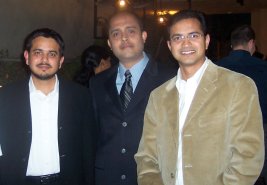Owais Mughal
 Measuring success is a relative term. A type of success where most people seem to agree is the success in one’s profession. Pakistan’s public universities and colleges, inspite of their little known world status, have repeatedly produced people who have excelled at all world forums. We have one such recent success to report where members of Pakistani diaspora; all with education from a public university of Pakistan; have excelled in their profession internationally.
Measuring success is a relative term. A type of success where most people seem to agree is the success in one’s profession. Pakistan’s public universities and colleges, inspite of their little known world status, have repeatedly produced people who have excelled at all world forums. We have one such recent success to report where members of Pakistani diaspora; all with education from a public university of Pakistan; have excelled in their profession internationally.
 The sucess story is of a hi-tech company in US which went public yesterday and got listed at NASDAQ. The Company’s name is Cavium Networks. It was co-founded in 2000 by Raghib Hussain, a graduate from NED University of Engineering and Technology Karachi. After the initial set-up, Raghib was joined by Amer Haider and Imran Badr; also the graduates of NED; who helped in establishing the marketing and software departments for the company respectively.
The sucess story is of a hi-tech company in US which went public yesterday and got listed at NASDAQ. The Company’s name is Cavium Networks. It was co-founded in 2000 by Raghib Hussain, a graduate from NED University of Engineering and Technology Karachi. After the initial set-up, Raghib was joined by Amer Haider and Imran Badr; also the graduates of NED; who helped in establishing the marketing and software departments for the company respectively.
 While many years of hardwork brought the success to these gentlemen and their team, the point to be noted is their roots of technical skills and education which was imparted to them in public institutions of Pakistan. I read it at PASHA (Pakistan Software Houses Assosiation) website that it is the story of people who are making it big from the corridors of NED university to Wall Street.
While many years of hardwork brought the success to these gentlemen and their team, the point to be noted is their roots of technical skills and education which was imparted to them in public institutions of Pakistan. I read it at PASHA (Pakistan Software Houses Assosiation) website that it is the story of people who are making it big from the corridors of NED university to Wall Street.
Up until 18-20 years ago, the three main characters of our success story, probably oblivious of each other’s existence, were studying at three different Government owned pre-engineering colleges of Karachi.  Raghib went to Karachi’s Delhi Science College.
Raghib went to Karachi’s Delhi Science College.
Photo to the left is a satellite image of Delhi College Karachi.
Amer Haider went to DJ (Dayaram Jethmal) Science college and Imran Badr went to Malir Cantt college. Good grades in their HSC exams got these gentlemen an admission into a public sector university (NED). Raghib was two years senior than Amer Haider and Imran Badr and went on to graduate as a Computer Systems Engineer in 1993.Amer Haider graduated as a Mechanical Engineer and Imran as an Electrical Engineer in 1995.
Despite graduating from the same university the paths of these three?gentlemen were still very different. Raghib started his career working at Zelin (Pvt.) Ltd., and then ITIM Associates in Karachi before moving to US.
Amer Haideralso started his technical and management career in Karachi with Wavetech and other local concerns before moving to the US.
Imran Badr worked in Karachi for 4 years with local companies and Reuters before moving to the US.

In the photo above the three gentlemen standing from L to R are Amer Haider, Imran Badar and Raghib Hussain
Along the way,few more NEDians have been joined the team; specifically Faisal Masood, Syed Saadullah Hussain in Software and Sabahat Ashraf the lead technical writer. The total work force strength of the company has now grown up to 177.
Yesterday was a big day in this company’s history as it went public and we wish all the stakeholders good luck. We would also like to hear more stories of succes from you where Pakistani diaspora coming from Public institutions have done well in their profession. Please share your thoughts and experiences below.
Acknowledgements: Special thanks to iFaqeer who provided me with background material and two photos for this article.




















































This is great news and such people always make way for many others to do good as well.
But I don’t see that successful entrepreneurship and creativity has much in common with public universities in Pakistan.
Dont get me wrong, I do wish above all to see public universities the best education facilities in the country but somehow I feel the private universities have given more output in recent times and the best example is LUMS. I dont think money and funds has a lot to do with creating a strong academic culture, public universities in general are already lucky to get more focused students than private univs. But out of a batch of say 200, the usual 30-50 will make their way, the rest will be the usual average. And this is just about the general feel of every other university, either private or public.
Somehow something is still missing. And a really bad thing to add to that is the emerging trend of alumni lobbying in Pakistan. U can find many companies, favorite with a particular univ. Some have more NEDians, some have more KU students, others have more FASTians. total crap!
Just look at the faculty at public univs. Ive heard more incidents of politics for new upbeat faculty at public univs. than anywhere else. most of them feel so dejected, they reject the whole country and fly away….most of them, again!
Heart warming. Proud of Amer, Imran and Raghib’s achievements – congratulations.
And Adnan, you are correct about the absence of R&D culture but the truth is that most Pakistanis overseas succeeded not because of the education they received back home but inspite of it.
Sweet!
You guys rock!
Take Care,
Mudassir Azeemi,
San Francisco,CA
Qaisrani, believe me, Raghib and others have tried to set up shop in Pakistan. And you will have noticed the ITIM connection–Raghib, and I, and others were working in offshore software inside Pakistan years before most people had heard the phrase. And I am a great advocate of doing buiness in Pakistan. But the Pakistani market isn’t as predictable and as sure a bet as the Indian one for offshore operations. Like the early days of Indian offshoring, some folks succeed and others don’t. But we all keep trying.
And the Indian connection for Cavium isn’t too far from home; the other founder of the company is a very down-to-earth Indian Muslim from Hyderabad named Syed B. Ali. Someone I, at least, as just as proud of.
The one thing that doesn’t seem to have come through in the article above is the fact that Raghib is one of the first people to clearly and boldly state on his bio, even in SEC filings, that his background is solidly Pakistani, and solidly NED. Do a search of the SEC’s database on words like Pakistan, NED, etc. and see for yourself. (You can start at sec.gov–they have searchable databases.) So, in a lot of ways, his story is precisely the opposite of what you are complaining of; his is a story of confidence and pride in Pakistan, in being a Pakistani, and, I dare say, Pakistaniat.
Unlike a lot of even the folks actually setting up shop in Pakistan just to get cheap labour, and not doing anything to help develop and support that labour force beyond giving them a salary, I see Raghib as part of the solution.
It always makes me wonder why Pakistanis are not inclined in field of R&D? I am not talking about Engineering or Scinece only, there is no R&D culture in any field.
How resources are wasted in Pakistan, I would like to share what’s happening at recently developed LEJ[latif ebrahim jamal] center which is equipped with high speed Internet,WiFi, wide electronic screens,online world libraries etc etc . One can attend the lectures of any topic by professors of different universities of world and KU/LEJ managment pays $200/lecture. Guess what? the center is being used for things like chatting,emailing and orkut. Noone is intrested to attend lectures. Students don’t attend lectures and managment run lecture on Electronic slides just for sake of “Khaana puri”. KU managment has been wasting $200/lecture and noone is asking about wastage. In presence of such environment, it’s stupidity to expect something good from our side. There was a time when we were good in agriculture research but it seems it’s also dead now. there was a time when 5/6 NED departments were able to produce something. Now there are 10+ or 15+ department and we hardly hear about any achivement.